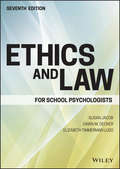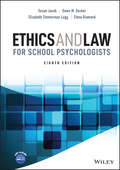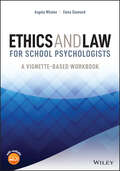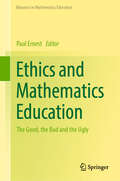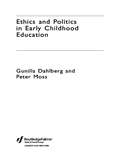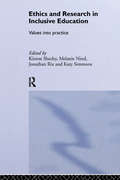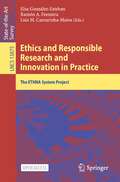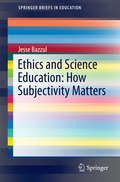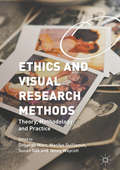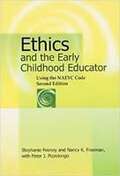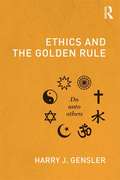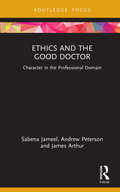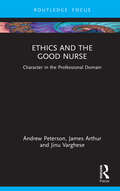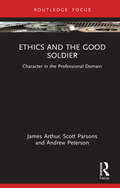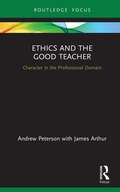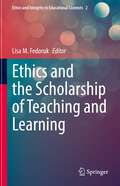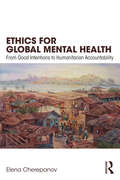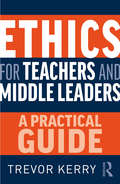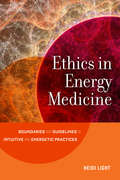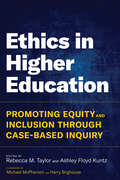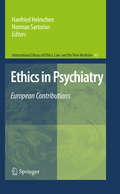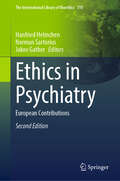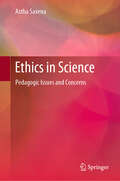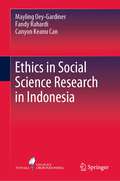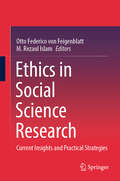- Table View
- List View
Ethics and Law for School Psychologists
by Dawn M. Decker Susan Jacob Elizabeth Timmerman LuggEthics and Law for School Psychologists is the single best source of authoritative information on the ethical and legal issues school psychologists face every day. Designed specifically to meet the unique needs of psychologists in school settings, this book includes the most up-to-date standards and requirements while providing an introduction to ethical codes, ethical decision making, and the legal underpinnings that protect the rights of students and their parents. This new seventh edition has been extensively updated with the latest research and changes to the law, with an increased focus on ethical-legal considerations associated with the use of digital technologies. Coverage includes new case law on privacy rights, electronic record keeping, the 2014 Standards for Educational and Psychological Testing, digital assessment platforms, the latest interpretations of the Individuals with Disabilities Education Act, and more. Ethics texts for counseling and psychology are plentiful, and often excellent—but this book is the only reference that speaks directly to the concerns and issues specific to psychologists in school settings. Case vignettes, end-of-chapter questions, and discussion topics facilitate deeper insight and learning, while updated instructor's resources bring this key reference right into the classroom. Keeping up with the latest research and legal issues is a familiar part of a psychologist's duties, but a practice centered on children in an educational setting makes it both critical and more complex. Ethics and Law for School Psychologists provides a central resource for staying up to date and delivering ethically and legally sound services within a school setting.
Ethics and Law for School Psychologists
by Dawn M. Decker Susan Jacob Elizabeth Timmerman Lugg Elena Lilles DiamondA comprehensive and robust discussion of practical issues and applications of legal-ethical rules for psychologists practicing in school settings In the newly revised Eighth Edition of Ethics and Law for School Psychologists, a team of expert practitioners and researchers delivers a one-stop sourcebook on ethics and law specifically designed for psychologists working in educational settings. It offers up-to-date information on the ethical principles and standards- and the law- relevant to providers of school psychological services. The book presents an integrated discussion of ethics and law and an ethical-egal decision-making model that supports socially just practice. Throughout, psychologists are encouraged to strive for excellence in their work with students, families, and teachers rather than meetin minimal obligations outlined in codes of ethics and law. Readers will also find: A thorough introduction to the practice of psychology in a school setting, including quality control, ethics training, legal decision making, and unethical conduct. An exploration of the interaction between law and school psychology, including discussions of legal training for school psychologists and lawsuits agains schools and school psychologists. Treatments of ethical and legal issues in the education of students with disabilities under the Indviduals with Disabilities Education Act An indispensable resource for practicing school psychologists, psychiatrists, counselors, social workers, and other mental heatlh professionals, Ethics and Law for School Psychologists is also an essential sourcebook for graduate students of psychology and social work students.
Ethics and Law for School Psychologists: A Vignette-Based Workbook
by Elena Lilles Diamond Angela WhalenLearn to confidently respond to complex ethical-legal dilemmas in school psychology In Ethics and Law for School Psychologists: A Vignette-Based Workbook, a team of accomplished practitioners delivers a hands-on resource designed to improve your ability to apply systematic ethical-legal decision-making skills to everyday practice in a school setting. The book includes a throughgoing focus on social justice and equity that prepares students and professionals to confidently respond to the complex challenges regularly presented in school psychology. The authors bridge the gap between ethics and law coursework and real-world ethical and legal dilemmas by offering opportunities for practice applying robust decision-making models to vignettes and cases distilled from the authors’ experiences in practice. Readers will also find: Explanations of the DECIDE ethical-legal decision-making framework for approaching practice dilemmas Worksheets illustrating the problem-solving process for school psychology practitioners Structured role plays for practicing difficult conversations with administrators, colleagues, parents, and othersAn indispensable resource for graduate students and experienced practitioners seeking to better recognize and respond to ethical-legal challenges in the field, Ethics and Law for School Psychologists: A Vignette-Based Workbook will also benefit graduate educators, mentors, supervisors, and continuing education providers.
Ethics and Mathematics Education: The Good, the Bad and the Ugly (Advances in Mathematics Education)
by Paul ErnestThis edited volume is an inquiry into the ethics of mathematics education, and to a lesser extent, the ethics of mathematics. The imposition of mathematics for all raises questions of ethics. What are the ethics of teaching school mathematics? What are the costs as well as the benefits? What are the ethical issues raised by the official aims of mathematics teaching, the planned curriculum, the pedagogies employed in school and college mathematics and the assessment systems? These questions are addressed in the book as well as what systems of ethics we might use. The volume ventures into a burgeoning new field. It offers a unique set of investigations, both theoretical and in terms of practices. It announces the ethics of mathematics education as a new subfield of research and includes valuable contributions from many of the best-known researchers in mathematics education; additionally, it is a valuable resource for students, teachers and researchers in the field. This is an enduring and classic source book in the field. From the wisdom of leading scholars to the little heard voices of students, this collection offers the reader many striking new insights into the ethics of mathematics and education.
Ethics and Politics in Early Childhood Education (Contesting Early Childhood)
by Peter Moss Gunilla DahlbergThe early childhood services of Reggio Emilia in Northern Italy has gained worldwide interest and admiration. Drawing on the ‘Reggio approach’, and others, this book explores the ethical and political dimensions of early childhood services and argues the importance of these dimensions at a time when they are often reduced to technical and managerial projects, without informed consideration for what is best for the child. Extending and developing the ideas raised in Beyond Quality in Early Childhood Care and Education the successful team of authors make a wide range of complex material accessible to readers who may have little knowledge of the various important and relevant areas within philosophy, ethics, or politics, covering subjects such as: post-structural thinkers and their perspectives the history and practice of early childhood work in Reggio Emilia globalization, technological change, poverty, and environmental degradation ethical and political perspectives relevant to early childhood services from Foucault and Deleuze, to Beck, Bauman and Rose. This book presents essential ideas, theories and debates to an international audience. Those who would find this particularly useful are practitioners, trainers, students, researchers, policymakers and anyone with an interest in early childhood education.
Ethics and Research in Inclusive Education: Values into practice
by Jonathan Rix Katy Simmons Kieron Sheehy Melanie NindThe recent move towards inclusive education has radically influenced the way educational research is conducted. Students need to become aware of the critical legal and ethical responsibilities that arise from investigation in this new and expanding area. Written from the standpoint of inclusive education, rather than 'special education', this carefully edited collection of readings from a wide variety of sources, will develop the student's ability to: * identify and respond to ethical dilemmas that occur within their particular research methodologies and settings. * respond appropriately to the myriad of complex legal issues that are pertinent to their own workThe contributions to this book draw upon examples of inclusive practices from around the world. Students taking postgraduate courses or diplomas in Inclusive education will find this an invaluable read.
Ethics and Responsible Research and Innovation in Practice: The ETHNA System Project (Lecture Notes in Computer Science #13875)
by Luis M. Camarinha-Matos Ramón A. Feenstra Elsa González-EstebanThis Open Access book aims to present practical contributions to the ethics governance framework, the conceptualization and characteristics of ethics tools, as well as the experience gained from their application in different institutions.Its main objective is to provide a practical and useful guide that will help other institutions to start introducing Research Ethics effectively in their organizations. The European initiative ETHNA System has designed an ethics governance framework that can be implemented following specific guidelines and tools that can help different types of institutions to promote and generate responsible research and innovation.The papers included in this book were organized in topical sections as follows: foundations; experiences and lessons learned; ethics tools in practice; and looking into the future: main challenges.
Ethics and Science Education: How Subjectivity Matters
by Jesse BazzulThis book encapsulates a line of research that looks at how students are positioned as ethical actors/decision makers in biology education by science policy, curriculum, and classroom resources. Its basis comes from a textbook study that examined how biology texts work to constitute subjectivities related to neoliberalism and global capitalism, sex/gender and sexuality, and ethics. The study found that textbook discourses set limits on a) the types of ethical concerns represented b) the modes of ethical engagement c) the dispositions necessary to engage in ethical action or decision-making. Policy reform, regulation, and personal lifestyle choices were the primary ways students could approach ethical decision-making or action. While these approaches are useful, they are likely not sufficient for dealing with major twenty first century problems such as climate change and social inequality, along with new ethical dimensions introduced by biotechnologies and genomic research. This research brief sets a context for how discourses of science education policy and curricula work to shape a 'subject of ethics', that is how students come to see themselves as participants in issues of ethical concern. Drawing from a structural-poststructural philosophical approach, Science and Technology Studies, educational research, and a methodology based on discourse analysis and ethnography, this book's overall goal is to assist with research into subjectivity, ethics, politics, policy, and socioscientific issues in science education.
Ethics and Visual Research Methods
by Susan Cox Deborah Warr Marilys Guillemin Jenny WaycottThis edited collection provides a comprehensive overview of ethical issues associated with visual research methods. Considering the work of researchers across a range of disciplines using visual methods in research, it offers practical and thoughtful discussions of emerging methodological and ethical dilemmas in innovative projects using visual methods, either in combination with other methods or as a stand-alone method to answer new kinds of research questions. Both synthesizing central themes and addressing ethical issues particularly relevant to specific research topics, in various settings and from various disciplinary perspectives, it considers how researchers navigate and conceptualise ethical issues. With contributions discussing research conducted in Australia, Argentina, Canada, India, Korea, Norway and the United Kingdom, the book's international scope, disciplinary breadth and the range of methods and research contexts addressed will notably appeal to those seeking to understand the value, and potential ethical risks, of visual methodologies for social research.
Ethics and the Early Childhood Educator: Using the NAEYC Code (2nd Edition)
by Peter J. Pizzolongo Stephanie Feeney Nancy K. FreemanThe second edition of Ethics and the Early Childhood Educator: Using the NAEYC Code is an NAEYC resource that we are pleased to publish and that follows a history of two minor revisions to the first edition. This edition includes situations that involve ethical dimensions--responsibilities and dilemmas-- based on the 2005 revision and the 2011 reaffirmation and updating of the Code.
Ethics and the Golden Rule
by Harry J GenslerIt is commonly accepted that the golden rule—most often formulated as "do unto others as you would have them do unto you"—is a unifying element between many diverse religious traditions, both Eastern and Western. Its influence also extends beyond such traditions, since many non-religious individuals hold up the golden rule as central to their lives. Yet, while it is extraordinarily important and widespread, the golden rule is often dismissed by scholars as a vague proverb that quickly leads to absurdities when one attempts to formulate it in clear terms. In this book, Harry J. Gensler defends the golden rule and addresses all of the major philosophic objections, pointing out several common misunderstanding and misapplications. Gensler first discusses golden-rule reasoning and how to avoid the main pitfalls. He then relates the golden rule to world religions and history, and to areas like moral education, egoism, evolution, society, racism, business, and medicine. The book ends with a discussion of theoretical issues (like whether all morality reduces to the golden rule, which the author argues against). Ethics and the Golden Rule offers two introductory chapters, the first is simpler and the second more technical; a reader may start with either or both. One can then read any combination of further chapters, in any order, depending on one’s interests; but Chapters 13 and 14 are technical and assume one has read Chapter 2. This is "a golden-rule book for everyone," accessible to a wide readership.
Ethics and the Good Doctor: Character in the Professional Domain (Character and Virtue Within the Professions)
by Andrew Peterson James Arthur Sabena JameelEthics and the Good Doctor brings together existing literature and an analysis of empirical research conducted by the Jubilee Centre for Character and Virtues to examine the ethical nature of medical practice and explore medicine as a virtuous profession. The book is based on the idea that medical practice is an inherently moral profession, in which notions of trust, care and meaningful relationships form the foundations of being a good doctor. By taking into account the ethical dimensions of medical practice that have come under greater scrutiny and pressure over recent years, this book explores how personal and professional character is understood, enacted, and experienced by medical practitioners at various stages of their career. Ethics and the Good Doctor situates and presents the empirical data in a way that is accessible to practicing doctors, medical students, and medical educators. Clear implications for policy, practice, and research are offered, ensuring this book will be of great interest to a range of stakeholders involved in medical practice, including those working in medical policy.
Ethics and the Good Nurse: Character in the Professional Domain (Character and Virtue Within the Professions)
by Andrew Peterson James Arthur Jinu VargheseEthics and the Good Nurse draws on internationally leading empirical research conducted by the Jubilee Centre for Character and Virtues and explores nursing as a virtuous profession through a close examination of nurses’ character. With the belief that virtues such as kindness, integrity, compassion and honesty are core to the nursing profession, this book draws on extended insights from the Jubilee Centre’s Virtuous Practicing in Nursing study to understand the role of such virtues in the professional practice and education of nurses. The book brings together knowledge from academics, scholars and practitioners to address the influence of personal and professional character on nurses and nursing. By including clear implications for policy, practice and research, Ethics and the Good Nurse serves as essential reading for a wide audience, including nurses, policy makers and nursing organisations and provides a timely and much-needed contribution to the field of nursing and character education.
Ethics and the Good Soldier: Character in the Professional Domain (Character and Virtue Within the Professions)
by Andrew Peterson James Arthur Scott ParsonsBuilding on extensive, internationally leading empirical research conducted by the Jubilee Centre for Character and Virtues, this book explores the soldier as a virtuous professional through a close examination of soldiers’ character and ethical reasoning. Starting from the view that virtues such as courage, honesty, loyalty and integrity are core to being a professional soldier, the book draws on insights from British soldiers at three stages of their career – officer cadets (at Sandhurst), junior lieutenants/captains (attending the Junior Officer Tactical Awareness Course), and senior captains (participating in the Captain’s Warfare Course). Drawing upon the Jubilee Centre’s Soldiers of Character study, the book explores soldiers’ character in the professional domain. Including clear implications for practice and research, this is essential reading for all those interested in the character of soldiers in both a professional and academic setting.
Ethics and the Good Teacher: Character in the Professional Domain (Character and Virtue Within the Professions)
by Andrew Peterson James ArthurEthics and the Good Teacher brings together reviews of existing literature and analysis of empirical data from three research projects conducted by the Jubilee Centre for Character and Virtues – The Good Teacher, Schools of Virtue and Teacher Education – to explore the ethical dimensions of the teaching profession. The book is premised on the idea that what constitutes a "good" teacher involves more than technical skills and subject knowledge. Understood as a professional activity, teaching involves an important ethical dimension, a fact that has come under increased scrutiny – and some would argue increased threat – over recent years as education and schooling have become shaped by market logic and accountability. Addressing the influence of personal and professional character on teachers and teaching, and containing clear implications for policy, practice and research, this book will be of great interest to teachers and other professionals working in education settings, as well as those working in educational policy. It will also appeal to academics, undergraduate students and postgraduate students researching the teaching profession and ethics/morality in education more generally.
Ethics and the Scholarship of Teaching and Learning (Ethics and Integrity in Educational Contexts #2)
by Lisa M. FedorukThis book addresses issues related to ethics and the scholarship of teaching and learning, and pays special attention to ethical concerns and experiences that have arisen from engaging in Scholarship of Teaching and Learning (SoTL) work. The book draws on a range of research projects, theoretical frameworks and narrative experiences to provide multiple perspectives of how meaning is made of research ethics in SoTL, academic community and REB partnerships, experiences of Students as Partners in SoTL, and ethically-minded approaches to teaching, learning and inquiry. Specifically, this edited book includes ethical practices that have become increasingly expansive in an ever-evolving academic environment such as navigating pandemic pedagogy and data ownership due to increased online content. In addition, contributions pertaining to academic community partnerships between REBs and faculty detail realistic narratives and lessons learned about how higher education can become more equitable, diverse and inclusive. Subsequently, decolonial ethics for teaching and learning in higher education, as well as participatory parity, exemplify the need for SoTL practitioners to be responsive to the social and cultural realities of a global context in ways that address social inequities and social responsibility. Relational ethics by way of student perspectives on vulnerability and classroom-based SoTL research underscore the need for students to be taught about their own agency as a means of providing student voice within SoTL work. Lastly, this book celebrates how ethically-minded approaches to teaching, learning and inquiry uncover strategies and pedagogy that encourage concepts such as ethical imagination and systems and design thinking practices.
Ethics for Global Mental Health: From Good Intentions to Humanitarian Accountability
by Elena CherepanovEthics for Global Mental Health examines the limitations of current normative approaches to global mental health (GMH) work and argues for a values-based framework that prioritizes accountability and contextual relevance of humanitarian and profession-specific values. It cautions against using aspirational ideals as operational guidance. Chapters are organized around challenges arising in humanitarian research, disaster relief, post-conflict recovery, fieldwork, and refugee resettlement and are designed to equip readers with strategies for resolving professional dilemmas and negotiating conflicting priorities. Also included is a sample training curriculum as well as case studies and exercises that help professionals address countertransference and burnout, and recognize ethically questionable practices such as trauma tourism, rescuer fantasy, or savior complex.
Ethics for Teachers and Middle Leaders: A Practical Guide
by Trevor KerryEvery school has a mission statement based on values and ethical beliefs. Ethics for Teachers and Middle Leaders sets out a way of thinking through the key issues of ethics in teaching and shows how a school’s ethical values can be translated by students and staff into action. It is designed to help rehearse certain ethical dilemmas and guide teacher leaders in helping others to think through and develop appropriate behaviours. Chapters consider the role of ethics in all aspects of school life including teacher professionalism, teaching methods, lesson planning and assessment. This book not only examines everyday concerns such as class management and presenting curriculum ethically, but also touches upon emerging issues in e-learning, career building, leadership and school governance. Packed full of real examples from schools and opportunities to reflect, the book will help readers to understand how their behaviour, decisions and advice to others might be guided and to avoid some of the common pitfalls in school. This insightful book will instil confidence in teachers and middle leaders as they face such ethical dilemmas in their daily work.
Ethics in Energy Medicine: Boundaries and Guidelines for Intuitive and Energetic Practices
by Heidi LightThe first guidebook to discuss the full scope of the intuitive process and propose structures to keep practitioners and clients safeHeidi Light, a family counselor and certified hypnotherapist, asserts that we are in desperate need of guidance and standards so that we can approach the world of intuition, energy, and mysticism from a healthy and respectful place. Drawing from her more than forty years as a medical intuitive, empath, and energy tracker—as well as twenty years as a counselor in private, clinical, and institutional settings—Light offers practical, simple solutions to the alarming lack of boundaries in the fields of intuition and energy medicine. From massage therapists who just throw in a little extra energy work, to psychics who read your sister instead of you, or to practitioners who tell you to take off your clothes, Light shares case studies and vignettes of ethical boundaries mistakenly being crossed. This book explains the traditional psychological model of ethics that counselors and psychologists are taught and outlines an ethical energetics model as a framework for moving through the process of accessing intuitive information and working with energy. Experienced energy workers, those new to the field and just opening to their intuition, and those who come to them for services need to know these ethical guidelines of boundaries and consent.
Ethics in Higher Education: Promoting Equity and Inclusion Through Case-Based Inquiry
by Rebecca M. Taylor and Ashley Floyd KuntzIn this thought-provoking volume, editors Rebecca M. Taylor and Ashley Floyd Kuntz invite readers to explore the many facets of on-campus ethical dilemmas and the careful, nuanced decision-making processes required to address them.Taylor and Kuntz demonstrate how to apply collaborative, multidisciplinary, philosophical inquiry to deeply complex issues. They present seven normative case studies focusing on a variety of campus quandaries, from urgent matters such as Title IX violations and free speech in social media policy to long-simmering concerns such as admissions and access and the future of historically Black colleges and universities. The editors then bring together a diverse group of scholars and practitioners with a broad array of disciplinary and personal backgrounds to offer their commentary and insight on the cases.Leaders in higher education are under immense pressure to respond to campus crises quickly, to quell controversy, and to avoid the backlash of public scrutiny in an ever-shifting sociopolitical terrain. Yet, in tension with such pressures, adequate responses to these dilemmas require leaders to make ethical, contextual choices that effectively foster inclusion, respect individual and institutional freedoms, and promote equity.Expanding the scope of inquiry, the contributors challenge underlying assumptions, raise points that had been omitted from the original cases, and imagine alternative solutions. Ethics in Higher Education appeals to readers to do the same, in the interest of advancing ethical decision-making on campuses.
Ethics in Psychiatry: European Contributions
by Norman Sartorius Hanfried HelmchenEthics in Psychiatry: (1) presents a comprehensive review of ethical issues arising in psychiatric care and research; (2) relates ethical issues to changes and challenges of society; (3) examines the application of general ethics to specific psychiatric problems and relates these to moral implications of psychiatry practice; (4) deals with recently arising ethical problems; (5) contains contributions of leading European ethicists, philosophers, lawyers, historians and psychiatrists; (6) provides a basis for the exploration of culture-bound influences on morals, manners and customs in the light of ethical principles of global validity.
Ethics in Psychiatry: European Contributions (The International Library of Bioethics #110)
by Norman Sartorius Hanfried Helmchen Jakov GatherThis book presents a comprehensive review of ethical issues arising in psychiatric care and research. Compared to the first edition, ten of the 40 chapters comprising the book are new, dealing with topics that were not covered in the previous edition. A further 28 chapters have been updated by the previous authors or completely rewritten by new authors. Containing contributions by leading European ethicists, philosophers, legal scholars, and psychiatrists, this book presents an excellent resource of information and insights for both psychiatrists and other professionals who wish to develop knowledge, understanding, and awareness about ethical issues arising in their practice, research and public health action. Chapter 6 is available open access under a Creative Commons Attribution 4.0 International License via link.springer.com.
Ethics in Science: Pedagogic Issues and Concerns
by Astha SaxenaThe book approaches the subject of ethics in science from a pedagogical and pragmatic viewpoint and addresses the need to effectively deal with these issues in science classrooms at the K-12 and undergraduate levels, drawing on real-world cases to do so. The book also explores ethical issues in connection with recent biotechnological advances and urges the reader to move beyond a disciplinary understanding and adopt an interdisciplinary view of the entire issue.Intended to initiate a process of reflecting on and investigating these ethical issues related to biotechnologies, and to enable the reader to take a personal stance on these issues rather than being led by outside agencies, the book offers a source of in-depth study material for researchers working in this area, as well as a training manual for teachers at both in-service & pre-service level, teacher educators, curriculum designers and professionals working in the field. Combining theory and practice, and including teachers’ reflections on their own pedagogic practice, it offers a valuable resource to help teaching professionals conduct experiments and achieve pedagogic innovations in their own work.“‘Ethics in Science- Pedagogic Issues & Concerns’ is an excellent textbook for high school and college students that provides an overview of the ethical issues in science and technology and includes useful cases studies and questions for discussion. I recommend it highly.”—David B. Resnik, JD, PhD, Bioethicist and IRB Chair, National Institute forEnvironmental Health Sciences, National Institutes of Health, USA“Given the recent proliferation of biological and biomedical knowledge, the need for education in the relationship between science and ethics has become ever increasingly essential. The book by Dr. Saxena provides a valuable introduction on how to inaugurate such an education. This book is an excellent template for those attempting to teach science and ethics.”—Bernard.E.Rollin, University Distinguished Professor,Colorado State University, Colorado, USA“This book by Dr Astha Saxena, a well-qualified educationist, fulfils a need for such a book for students of Science and Technology stream. The coverage is comprehensive and the writing is lucid. I endorse this book as it will bring a criticality of thinking among Indian students.”—Kambadur Muralidhar PhD, FASc, FNASc, FNA,University of Hyderabad, Hyderabad“Science without ethics can lead to false scientific claims as well as unbridled technological growth. The present book conceptualizes this integration of ethics and science beautifully with academic rigour.”—Alka Behari, Professor, Department of Education,University of Delhi, New Delhi, India
Ethics in Social Science Research in Indonesia
by Mayling Oey-Gardiner Fandy Rahardi Canyon Keanu CanThis textbook presents ethical guidelines for conducting research in the social sciences, focused on Indonesia. As a country with a fast-growing research environment, the real-life cases of ethical issues that arise in Indonesia can teach both aspiring and established researchers how to approach the complexity of research ethics and dilemmas. With technological advancement affecting how research is conducted, the necessary ethical guidelines for research are also evolving. The instantaneous nature of information movement has made confidentiality in research data more critical than before, and any negligence in protecting research participants has an unprecedented scope of damage. The methods book synthesises hundreds of worldwide ethical guidelines and past issues that social science researchers will find highly relevant. Arranged chronologically to represent each research stage—from research preparation to post-research—the book prepares researchers to mitigate ethical crises. Relevant to all social scientists, both emerging and established, conducting research in Indonesia, this co-published textbook between Springer and OBOR is also relevant to researchers beyond the archipelago. It is also an indispensable teaching resource for lecturers in research methods and ethics across social science disciplines.
Ethics in Social Science Research: Current Insights and Practical Strategies
by M. Rezaul Islam Otto Federico von FeigenblattThis book offers a comprehensive and practical exploration of research ethics in various social science disciplines. It goes beyond theory to provide practical guidance for researchers by offering concrete strategies, case studies, and examples to navigate ethical challenges in their research contexts. It equips readers with actionable insights and tools for ethical decision-making, enhancing its value as a practical resource. The chapters share the expertise of distinguished scholars worldwide, offering a nuanced understanding of diverse research contexts. This interdisciplinary lens makes the book relevant and applicable to a broader readership. The chapters include recent developments, emerging ethical issues, and relevant changes in guidelines and regulations. It engages readers through an accessible writing style that presents complex ethical concepts and frameworks clearly and understandably. The insights and strategies foster a deeper appreciation for ethical research practices and a nuanced understanding of the ethical obligations inherent in social science research. It caters to academic audiences and researchers who may be new to the subject, making it more approachable and appealing to a broader readership. It is an indispensable resource for researchers, educators, and practitioners seeking to fortify their understanding of ethical responsibilities and best practices within social science research.
